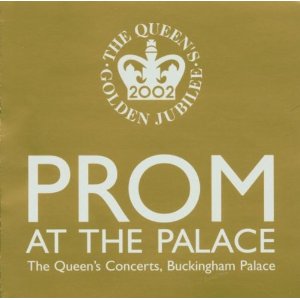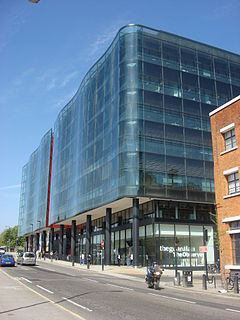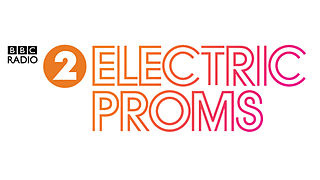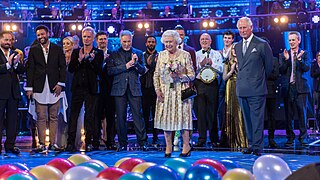
The BBC Proms or Proms, formally named the Henry Wood Promenade Concerts Presented by the BBC, is an eight-week summer season of daily orchestral classical music concerts and other events held annually, predominantly in the Royal Albert Hall in central London. The Proms were founded in 1895, and are now organised and broadcast by the BBC. Each season consists of concerts in the Royal Albert Hall, chamber music concerts at Cadogan Hall, additional Proms in the Park events across the UK on the Last Night of the Proms, and associated educational and children's events. The season is a significant event in British culture and in classical music. Czech conductor Jiří Bělohlávek described the Proms as "the world's largest and most democratic musical festival".

Sir Henry Joseph Wood was an English conductor best known for his association with London's annual series of promenade concerts, known as the Proms. He conducted them for nearly half a century, introducing hundreds of new works to British audiences. After his death, the concerts were officially renamed in his honour as the "Henry Wood Promenade Concerts", although they continued to be generally referred to as "the Proms".

A concert is a live music performance in front of an audience. The performance may be by a single musician, sometimes then called a recital, or by a musical ensemble, such as an orchestra, choir, or band. Concerts are held in a wide variety and size of settings, from private houses and small nightclubs, dedicated concert halls, amphitheatres and parks, to large multipurpose buildings, such as arenas and stadiums. Indoor concerts held in the largest venues are sometimes called arena concerts or amphitheatre concerts. Informal names for a concert include show and gig.

Sir Alan Charles MacLaurin Mackerras was an Australian conductor. He was an authority on the operas of Janáček and Mozart, and the comic operas of Gilbert and Sullivan. He was long associated with the English National Opera and Welsh National Opera and was the first Australian chief conductor of the Sydney Symphony Orchestra. He also specialized in Czech music as a whole, producing many recordings for the Czech label Supraphon.

The Royal Festival Hall is a 2,700-seat concert, dance and talks venue within Southbank Centre in London. It is situated on the South Bank of the River Thames, not far from Hungerford Bridge, in the London Borough of Lambeth. It is a Grade I listed building, the first post-war building to become so protected. The London Philharmonic Orchestra, the Philharmonia Orchestra and the Orchestra of the Age of Enlightenment are resident in the hall.

The Queen's Hall was a concert hall in Langham Place, London, opened in 1893. Designed by the architect Thomas Knightley, it had room for an audience of about 2,500 people. It became London's principal concert venue. From 1895 until 1941, it was the home of the promenade concerts founded by Robert Newman together with Henry Wood. The hall had drab decor and cramped seating but superb acoustics. It became known as the "musical centre of the [British] Empire", and several of the leading musicians and composers of the late 19th and early 20th centuries performed there, including Claude Debussy, Edward Elgar, Maurice Ravel and Richard Strauss.

The Roundhouse is a performing arts and concert venue situated at the Grade II* listed former railway engine shed in Chalk Farm, London, England. The building was erected in 1846–1847 by the London & North Western Railway as a roundhouse, a circular building containing a railway turntable, but was used for that purpose for only about a decade. After being used as a warehouse for a number of years, the building fell into disuse just before World War II. It was first made a listed building in 1954.
The Orchestra of the Age of Enlightenment (OAE) is a British period instrument orchestra. The OAE is a resident orchestra of the Southbank Centre, London, associate orchestra at Glyndebourne Festival Opera Artistic Associate at Kings Place, and has its headquarters at Acland Burghley School. The leadership is rotated between four musicians: Matthew Truscott, Kati Debretzeni, Huw Daniel and Margaret Faultless.

A music venue is any location used for a concert or musical performance. Music venues range in size and location, from a small coffeehouse for folk music shows, an outdoor bandshell or bandstand or a concert hall to an indoor sports stadium. Typically, different types of venues host different genres of music. Opera houses, bandshells, and concert halls host classical music performances, whereas public houses ("pubs"), nightclubs, and discothèques offer music in contemporary genres, such as rock, dance, country, and pop.

The Prom at the Palace was a British classical music concert held in London in 2002. The event was in commemoration of the Golden Jubliee of Queen Elizabeth II. It was held at Buckingham Palace Garden on 1 June 2002 forming part of the Golden Jubilee Weekend. It was the classical equivalent of the Party at the Palace, a pop/rock music event. Its name reflects the popular season of classical concerts held at the Royal Albert Hall, The Proms. The event was broadcast by the BBC and shown in more than 40 countries. It was directed by Nicholas Kenyon.

Sir Mark Philip Elder is a British conductor. He is currently music director of the Hallé Orchestra in Manchester, England.
The Australian Brandenburg Orchestra (ABO) is an Australian period instrument orchestra specialising in the performance of baroque and classical music.

Kings Place is a building in London’s Kings Cross area, providing music and visual arts venues combined with seven floors of office space. It has housed the editorial offices of The Guardian newspaper since December 2008 and is the former headquarters of Network Rail and CGI.
Harry Alexander Clarence Bicket is a British conductor, harpsichordist and organist. He is particularly associated with the baroque and classical repertoire.

The BBC Radio 2 Electric Proms was an October music festival in London run by the BBC for five years, 2006–2010. On 31 January 2011, the BBC announced that the event would be discontinued with immediate effect due to financial cutbacks.
Charles Matthew Egerton Hazlewood is a British conductor. After winning the European Broadcasting Union conducting competition in 1995 whilst still in his twenties, Hazlewood has had a career as an international conductor, music director of film and theatre, composer and a curator of music on British radio and television, Motivational Speaker and founder of Paraorchestra – the world's first integrated ensemble of disabled and non-disabled musicians. He was a guest on BBC Radio 4's Desert Island Discs in May 2019 and became Sky Arts' Ambassador for Music in January 2021.

Dame Sarah Patricia Connolly is an English mezzo-soprano. Although best known for her baroque and classical roles, Connolly has a wide-ranging repertoire which has included works by Wagner as well as various 20th-century composers. She was appointed a Commander of the Order of the British Empire (CBE) in the 2010 New Year Honours and a Dame Commander of the Order of the British Empire (DBE) in the 2017 Birthday Honours for services to music.

Prom 13: Doctor Who Prom was a concert showcasing incidental music from the British science fiction television series Doctor Who, along with classical music, performed on 27 July 2008 in the Royal Albert Hall in London as part of the BBC's annual Proms series of concerts. The Doctor Who Prom was the thirteenth concert in the 2008 Proms season, and was intended to introduce young children to the Proms.
Iestyn Davies is a British classical countertenor.

The Queen's Birthday Party was a music concert held at the Royal Albert Hall in London on 21 April 2018 to celebrate the 92nd birthday of Queen Elizabeth II. Organised by the Royal Commonwealth Society, the event coincided with the end of the 2018 Commonwealth Heads of Government Meeting, which had taken place in the United Kingdom during the previous week. The concert was presented by radio and television presenter Zoë Ball and featured contemporary artists, as well as those from the worlds of classical music and jazz, all of whom are from countries that belong to the Commonwealth of Nations. Artists included Tom Jones, Kylie Minogue, Sting, Shaggy, Shawn Mendes, Anne-Marie, The George Formby Society and Ladysmith Black Mambazo. Many of those who took part in the concert were accompanied by the BBC Concert Orchestra. The Queen was among concert attendees, along with other members of the Royal family. The concert was broadcast on BBC One and BBC Radio 2 in the UK and the Nine Network in Australia.















